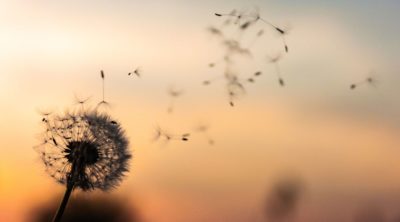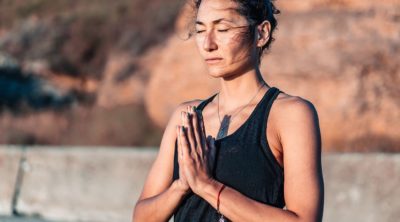According to Ayurveda, summer is considered Pitta season, where the solar force and energetic principles of fire and water are strong. Pitta season is characterized by its hot, sharp, fiery, and intense nature, and typically begins in late spring and lasts through early fall. Although these summer months are a fantastic time for self-expression, accomplishment, exploration, and adventure – they can also be a difficult time for the Pitta dosha.
When these attributes build up within the body and mind due to wrong diet and lifestyle, Pitta accumulates and begins to manifest various imbalances. Here are some signs that you might be getting overheated: You feel irritable, angry and easily stressed. You have inflammation, redness, puffiness and swelling. You’re experiencing loose stools and heartburn. These are some of the symptoms of too much of the fiery nature of Pitta.
Although Pitta types are more at risk of a Pitta imbalance during summer, Vata and Kapha types can also develop Pitta imbalances, so it’s important to find ways to counteract the intense heat by embracing a lifestyle that emphasizes the qualities of cool, heavy, dense, dry, slow, dull, and static.
How To Avoid Pitta Imbalance in Summer
Follow these Pitta balancing tips to help navigate the summer season with health and happiness.
Enjoy a Pitta Summer Diet
Eating food that helps to balance Pitta is one of the best ways to stay balanced in summer. According to the Charaka Samhita:
During the summer, the sun evaporates the moisture of the earth by its rays. In that season, the intake of sweet, cold, liquid, unctuous diets and drinks are prescribed.
Luckily, nature provides! Much of the produce that is in season during summer possess the qualities that pacify Pitta.
Fruit
- Apricots
- Avocado
- Blackberries
- Blueberries
- Cantaloupe
- Cherries
- Coconut
- Dates
- Grapes
- Limes
- Melons
- Nectarines
- Peaches
- Plums
- Raspberries
- Strawberries
- Watermelon
Vegetables
- Artichoke
- Beets
- Bell peppers
- Carrots
- Cucumbers
- Endive
- Green beans
- Leafy greens
- Lettuce
- Okra
- Peas
- Summer squash
- Zucchini
Herbs & Spices
- Basil
- Cardamom
- Cilantro
- Coriander
- Dill
- Fennel
- Mint
- Parsley
It’s important to note that Ayurveda typically recommends cooking foods to aid digestion, but during Pitta season, raw foods can be beneficial. Raw foods tend to be naturally cooling so enjoying fresh fruits and vegetables during summer will generally be supportive.
Stay Hydrated
The summer heat dries up the moisture from plants, the earth, and our bodies. That’s why it’s important to drink about eight 8-ounce cups of cool or room temperature water per day (but always listen to your body to know what it needs). For flavor:
- Try infusing your water with mint, lime and/or watermelon.
- Drink cooling Pitta herbal teas like mint, dandelion and hibiscus.
- Puree cucumbers, milk and sugar to make cucumber milk.
- Enjoy smoothies made from coconut and avocado.
Other summer hydration tips:
- Even though drinks are best at cooler temperatures, be cautious not to drink ice water as it will dampen the digestive fire (agni) and spoil digestion.
- Try to avoid drinking hot drinks too often.
- Limit stimulants like coffee and alcohol since they are known to increase Pitta’s hot and fiery nature. Instead consider starting your day with Chyawanprash tea.
Eat Lighter and Smaller Meals
During summer, our Agni or digestive fire disperses and is pulled to the extremities to keep the body cool. As a result, our digestion is weakened. That is why we are often less hungry and crave light foods in summer.
As we transition to summer, it is beneficial to:
- Eat lighter and smaller meals.
- Be fully present with your meals to help avoid the potential to overeat. It can be helpful to give thanks before eating to help you focus your attention.
- Eat your biggest meal at noon when your digestive fire is strongest.
Adjust Your Daily Routine
During Pitta season, wake up early to take advantage of cool temperatures and consider adding Pitta pacifying rituals to your morning routine:
- Use coconut oil when practicing Abhyanga.
- Take cooling baths and showers.
- Switch to a cooling, summer yoga practice. Slower movement practices, like yin yoga or moon salutations, are a great way to get exercise during Pitta season without over-exerting yourself.
- Practice Lunar Pranayama. A simple and effective pranayama practice that’s cooling and calming is lunar pranayama, also known as chandra bhedana (chandra means “moon” and bhedana means “passing through”). This type of breathwork involves inhalation from the left nostril and exhalation through the right nostril. This stimulates your lunar energy represented by ida nadi (channel of prana) and brings in the moon’s cooling energy.
- Schedule downtime. An overzealous schedule can lead to stress and hot emotions. When you add in the summer heat, Pitta imbalances can easily occur. To proactively pacify Pitta, try to take time for leisure. If you’re a Pitta type, it might be challenging to ‘take time off’ so consider scheduling time between appointments for rest and relaxation.
- Laugh everyday. Another tip for balancing Pitta is to try to get one good belly laugh everyday. Laughter can quickly diffuse hot emotions, and increase overall contentment and happiness.
- Spend time outside. The Pitta dosha is soothed by beautiful nature scenes, especially bodies of water, so try to spend as much time in nature as possible. Just be sure to avoid the hottest part of the day between 10 a.m.– 3 p.m. when the sun is at its height.
Have Fun with Summer Activities
One of the best ways to combine leisure, laughter and time outside is through summer activities! Connect with your inner child to soothe the Pitta dosha by enjoying the following activities:
- Visiting oceans, lakes and other bodies of water
- Swimming
- Kayaking
- Paddle boarding
- Taking a relaxing bike ride
- Enjoying a picnic in the shade
- Taking a gentle hike in a forest
- Strolling in the moonlight
- Walking barefoot on cool grass
- Stargazing
Take a Siesta As Needed
In general, Ayurveda does not recommend sleeping during the day. That said, summer is the one time of year that it can help. Sleeping during the day is thought to increase the kapha dosha, responsible for earth and water, which is a great antidote for the hot and fiery aspects of summer.
If you indulge in a nap, be sure to do it on an empty stomach, in the afternoon, and for no more than 30 minutes.
What to Avoid in Pitta Season
The following activities can aggravate Pitta and make it easier to fall out of balance in summer.
- Eating sour, salty, and pungent foods like cayenne, ginger, and garlic.
- Overexposure to the midday sun. When the sun is high in the sky, it’s best to limit activity. Exercise, in particular, is very heating and, in summer, is best done in the morning, when the temperatures are coolest.
- Busy schedules. Don’t over-schedule or take on too many tasks since this can lead to stress and hot emotions. Be aware that the passionate energy of Pitta may inspire you to try and accomplish more than you can handle, but the summer season is the most important time to practice leisure.
Learn more about the Pitta dosha and how to stay balanced.
Reviewed by Dr. Jayant Lokhande, MD (Botanical Drugs), MBA (Biotechnology)



